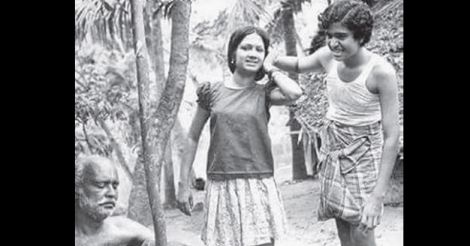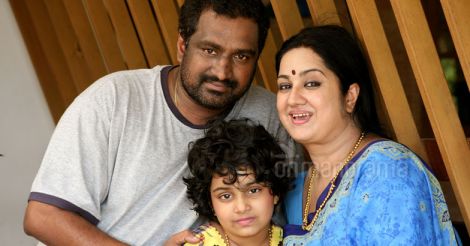Kalpana has told her colleague Salim Kumar about a near-death experience. She was due to deliver her child. A variation in blood pressure complicated matters and the doctors were hesitant to anesthetise her. She lost her consciousness. She saw herself rising above the earth. She could see the face of her still unborn child. She reached a place meant to be the souls of those who died in childbirth. The gatekeepers refused to admit her, saying her time has not come yet.
She opened her eyes, to the sight of the doctors struggling to revive the feeble rhythm of her heart. She knew she had returned from the dead.
When her time did come, she was alone in a hotel room in Hyderabad.
Check full coverage: Kalpana Bids Adieu
Kalpana was never alone in life. She grew up in a world of acting. She made her debut as a child actor in Yagam. Her first major role was in Tamil but she became synonymous with comedy in Malayalam.
 Kalpana and Sai Kumar on the sets of 'Ithum oru jeevitham'
Kalpana and Sai Kumar on the sets of 'Ithum oru jeevitham'Kalpana followed her sisters. Her elder sister Kalaranjini was a busy actor, pairing with legendary stars in south India such as N.T. Rama Rao. Younger sister Urvashi too made a mark in celluloid with her remarkable performance in Bhagyaraj’s Mundhanai Mudichu. She was meant to accompany Kalaranjini to the sets of the movie but ended up doing the role herself.
Kalpana’s time was yet to come. She had known the twists of a movie career right from the audition for the Jayabharati-starrer Kathirmandapam. The movie had roles for two child actors, the hero’s daughter and his friend’s daughter. When Kalpana went for audition along with Urvashi, the director was a bit skeptical. The children looked so much alike. That might suggest that the hero had loose morals. Two years younger, Urvashi was chosen for one of the roles while Kalpana was rejected.
Kalpana later did the lead role in Bhagyaraj’s Chinna Veedu. She was just 19 then. She also did the title role in Balu Mahendra’s Sathi Leelavathi. But she was not yet the phenomenon she was meant to be.
Her portrayal of Mohini in Kamal’s Peruvannapurathe Visheshangal started a trend in Malayalam movies. The movie became a super hit and the actor who played the foodie who courted Jayaram carved a space for herself. That was also the beginning of the hilarious pair of Jagathy Sreekumar and Kalpana, much in the footsteps of Adoor Bhasi and Sreelatha.
“My pumpkin face would seem even bigger on screen. That’s one reason for me getting so many films,” Kalpana would say with a laugh.
 Kalpana parted ways with Anil in 2012
Kalpana parted ways with Anil in 2012She would later complain to her mother that she was fed up with the comic roles. Her mother counseled her to be committed in whatever she did. She obeyed her mother. She had never won a state award but she was selected as the best actor by a national jury. She got recognised for her portrayal of Rasiya in Babu Thiruvalla’s Thanichalla Njan. “Isn’t it sweet?” someone asked. “It’s sweet revenge,” Kalpana replied, implying she was never considered for an award before that.
She had expected an award for her performance in Ranjith’s Spirit. She proved her deftness across genres in Anwar Rasheed’s Bridge in the anthology Kerala Cafe. She survived Malayalam cinema’s shift to new-gen films, essaying a mother’s role in Anjali Menon’s Bangalore Days.
Like so many comedians, Kalpana was struggling with tremendous grief. She was shattered by the untimely death of brother Prince, the accident another brother Kamal met with, marital discords in her sisters’ lives and the rift with her husband, director Anil. Kalpana parted ways with Anil in 2012. But she refused to be bogged down with any of these.
“Live tirelessly like a wave. Be immortal like the sea. This ocean does not need the salt of your tears,” Charlie told Mary in the recent blockbuster movie. Kalpana’s Mary did not wait to be saved. Neither did the actor.
























Disclaimer
The comments posted here/below/in the given space are not on behalf of Manorama. The person posting the comment will be in sole ownership of its responsibility. According to the central government's IT rules, obscene or offensive statement made against a person, religion, community or nation is a punishable offense, and legal action would be taken against people who indulge in such activities.